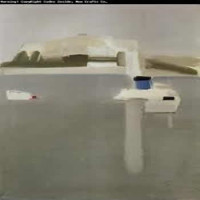3 Poets in the Griffith Review

The Griffith Review is not primarily a literary review but a magazine on Australian current affairs. Each edition is crafted about a particular theme, featuring a long essay, up to 20,000 words, which introduces work from other contributors aimed at provoking public debate, often successfully. The Review is published quarterly but does not always included poetry, at least to judge from the online selections in the archives.
Bruce Dawe is a well-known and popular poet who ended up in academia, in the University of New South Wales, from which he retired as Honorary Professor in 1992. He is the recipient of many awards and prizes. His poem, Expectation Valley, may be read here:
http://griffithreview.com/edition-28-still-the-lucky-country/expectation-valley
The poem opens to familiar country: the two dime western novel:
As you rein in your bronc on the high ridge
overlooking Hadleyville or Pobrecito or Wrangler
it is coming on dusk or it’s already early night
and your eyes squint shrewdly as you take in the scene;
Which is then quietly satirized:
it‘s been a long ride from Wherever and you wonder briefly
what this miserable apology for a cow-town holds
for a weary suntanned reader who figgers that down there
in a saloon called Last Chance or Lucky Strike
Just once I’d like to get to page 15 without any of these
doggone heroics and the smell of bar-room powder-smoke
And finishes with the happy ending obligatory to the genre:
at least there’ll be a persecuted small-rancher’s daughter
nestling in your arms by page 186…
All good fun, readily grasped, and none the worse for that.
Harvey poplars by John Kinsella continues the rural theme, but now the local setting is closely observed. The poem can be read here:
http://griffithreview.com/edition-41-now-we-are– ten/harvey-poplars
Where all of what was there
Is redacted to pasture and ditches,
Orchards and dairies.
The tone is not one of good-natured amusement, moreover, but has biblical echoes:
The eternal calf in the udder,
Or torment the fated poddy
Bellowing in its lone stall.
Indeed eternity:
Morning and evening light
Dappled and brindled by cows
So many body aches and pains.
Lines of cows, burning
Outside the eye of needle.
And ends with a reminder that whole lives are bound up this scene:
Vats of profit and tithes.
Each cow lugs its haul past
Poplars’ thin forest marking
Shortest distance between
Animal and vegetable lives.
Sighting Rottnest by Margaret Merrilles seems very different, and is to my mind the best of the poetry contributions to the Griffith Review. Ms. Merrilles is an Adelaide writer whose work has appeared in various anthologies, and runs her own blog at: www.margaretmerrilees.com The poem may be read here: http://griffithreview.com/edition-34-the-annual-fiction-edition/sighting-rottnest. The island in question is 18 km off the coast of Western Australia, and appears tantalizing to the commuter traveling in autumn between North Fremantle and Cottesloe.
rough serious blue sea
pale sky, pale spire
green grey island
Sometimes it seems:
a drifting island, not attached to the ocean floor. In some
weathers it floats close to the mainland. In some it disappears altogether.
We are given scraps of information, all relevant and accumulating to the overwhelming force of the poem.
It is a place of sand and wind. . . For tens of thousands of years the island was part of the mainland, a place where people lived.
silver sea
grey clouds
dark horizontal line
Winter comes, and another exact vignette appears:
strip of brown smog
island lurking beyond
With more information, darkening our view of the island:
In 1838 the European newcomers made Rottnest a prison, a racially segregated prison. By 1931,when it closed, thousands of Aboriginal men and boys had been incarcerated there. . . Hundreds died.
In the light of which, the island disappears:
ragged dark clouds
angry water with a turquoise edge
the island has gone
Spring brings a lighter picture:
strip of orange sun
deep aqua night
pale sickle moon
And more scraps of information. On someone who daily swam out to the island, and eventually drowned. On the writer’s own memories:
We were sixteen. Romance and ethics were our lifeblood.
Summer tops the island with cumulous:
white caps
bunchy clouds
brilliant white spire
green wedding cake island
And more information:
The old prison became a guesthouse. . . I had a job as a housemaid, making beds, washing sheets. I was told to iron the boss’s underpants. Excessive, I thought. . . I told the boss my grandmother had died. I caught the ferry back to Fremantle.
blue sky
blue sea
white lighthouse
white yachts
red spinnakers
red freighter
And then we gradually grasp the significance of the island:
When we were young Rottnest nights meant sex in the sand.
Later, for a clan of middle-aged dykes, nights were not so serious. . . The light above swooped round, a collective and individual benediction. One blessing for each of us every 7.5 seconds.
For now, past middle-age, the island will no witness the hopes of youth, or bring back the Aborigines incarcerated here. The land contains and shapes and memorializes our lives:
I see now that the light stops the island from drifting away into the ocean, the beams of light a
loose mooring.
Sea-rising times have come again. Rottnest will shrink. The mainland will shrink.
We will be needing lights.
The vignettes, extraordinarily beautiful though they are, are not merely descriptive but the Australian lands of lost content:
The happy highways where I went
And cannot come again.
